Born
Hajj Shaikh Fazl-Allah Nouri was born in Lashak, a village in Kojur district of Mazanandaran, Iran on Ḏu’l-qaʿda 2, 1259/November 24, 1843.
Ḥājj shaikh Fażl-allāh Nouri a prominent jurist who campaigned in the Iran Constitutional Revolution of 1906-1909 for constitutionalism according to the shariʿa (canonical laws of Islam), and in its default, preferred absolutism to secularism.
Education
Shaikh Fażl-Allāh, son of the local cleric Mollā ʿAbbās Kojuri, received his early education in Kojur and Tehran, and then left at an early age for the Shiʿite shrine cities (ʿAtabāt) in Iraq. There he studied under the prominent Shiʿite theologian Mirzā Ḥasan Shirāzi .
In about 1300/1882-83, he returned to Tehran and gradually emerged as its leading scholar and jurist.
He lived primarily on his fees from his shariʿa duties, and many of the notables and merchants of Tehran, as well as lesser bazaaris and officials, referred their cases to him. He was also highly regarded as a teacher and held regular classes.
Like other theologians (mojtaheds), Shaikh Fażl-Allāh fulfilled his expected obligation of representing the grievances of the people to the government. In 1896, when there was a water shortage caused by a draught in the Zhāleh Maydān district of Tehran, Shaikh Fażl-Allāh represented the concerns of the local people over problems with access to water to the governor of Tehran.
He was also the author of many distinguished works on a range of subjects, including jurisprudence (feqh), oṣul, and philosophy.
Political Activities and Islamic Government
In the later 1880s, Shaikh Fażl-Allāh was drawn into politics, along with the other leading religious leaders (ulama) as a result of the Iran Shah’s policy of increasingly awarding concessions to foreign entrepreneurs, seen as selling the Shiʿite land of Iran to European foreigners.
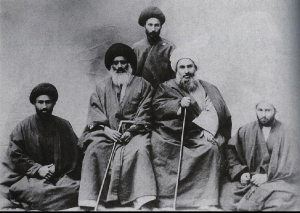
He obtained the view of his mentor, Mirzā Ḥasan Shirāzi, on this policy in some of the questions in a book entitled Soʾāl va javāb. It went to many editions. In these questions he purportedly drew from Mirzā Ḥasan Shirāzi the important argument that in periods when government (dawlat) and leadership of the community (mellat) were fixed in one place, as in the time of the Prophet, they were the responsibility of one person. However, nowadays these two duties were in separate hands but with a common responsibility, so that religion and the world of worshippers were protected at the time of the absence of the Imam of the Age. In effect, this argument, which perceived government as a joint responsibility of the ruler and the ulama, supported the active participation of the latter in political matters.
Thus Shaikh Fażl-Allāh, like his fellow clerics, played a part in the movement against the Tobacco Concession (monopoly over production, sale, and export of tobacco) granted by Nāṣer-al-Din Shah to the British Régie Company in 1309/1890-91. The movement resulted in the issuing of a fatwā by Mirzā Ḥasan Shirāzi banning tobacco smoking, and the cancellation of the Concession. Following the tobacco incident, Shaikh Fażl-Allāh was not particularly politically prominent.
In 1897, he was reported as leading a secluded life and being poor (compared to the other theologians and members of the Tehran elite) but much respected. However, he took some interest in the Pan-Islamic ideas current in Iran at the turn of the century, partly as a result of being received personally by the Ottoman ruler Sultan ʿAbd-al-Ḥamid on his way to Mecca on pilgrimage .
In 1902, along with a number of leading theologians, Shaikh Fażl-Allāh opposed the loan policies of the then grand vizier Mirzā ʿAli-Aṣḡar Khan Amin-al-Solṭān, which were considered to be selling the country to foreigners. They collaborated with a faction led by his rival, ʿAbd-al-Majid Mirzā ʿAyn-al-Dawla (q.v.), to remove him from office, and wrote letters to the provinces and the ʿAtabāt. When ʿAyn-al-Dawla came to power in 1903, Shaikh Fażl-Allāh became his principle supporter amongst the ulama, in a policy of bringing in financial reform without making substantial changes to the political system. ʿAyn-al-Dawla, who was not on good terms with Sayyed ʿAbd-Allāh Behbahāni, the favored theologian of Amin-al-Solṭān, passed the government religious and public affairs to Shaikh Fażl-Allāh. As a result, Shaikh Fażl-Allāh benefited substantially both financially and in terms of influence.
In December 1905, given his connection to ʿAyn-al-Dawla, Shaikh Fażl-Allāh showed no enthusiasm for the campaign against the customs reforms, which changed into a demand for an ʿadālat-ḵāna (house of justice), and rebuffed the followers of Behbahāni when they tried to engage his support.
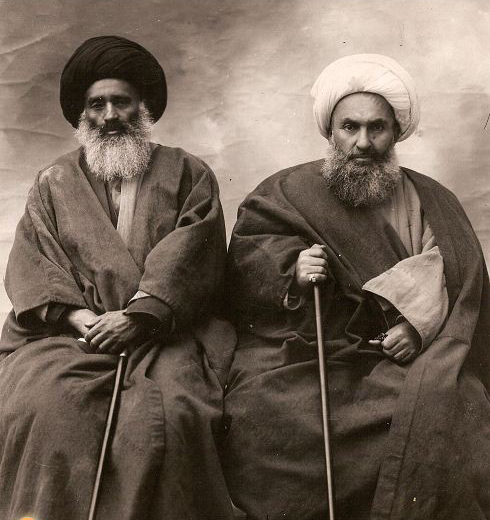
In Jomādā I 1324/July 1906, when the agitation for the creation of a house of justice and the removal of ʿAyn-al-Dawla became, in effect, a movement to change the political system, Shaikh Fażl-Allāh delayed for three days his departure to join the other leading ulama who had taken asylum (bast) in the shrine of Qom. Finally, probably realizing that he would lose influence and prestige if he remained, he left on the 18 July (26 Jomādā I), accompanied by a large following, and much weakening the position of ʿAyn-al-Dawl. Once in Qom, Shaikh Fażl-Allāh, like the other ulama, assisted in defraying the expenses of the bast, and reportedly bore a higher cost since he had the largest personal following. Thereafter, he acquiesced to the demand not only for reform but also for the establishment of a majles, but on the understanding, like most of the ulama, that it was to be an Islamic institution.
He cooperated with Sayyed ʿAbd-Allāh Behbahāni and Sayyed Moḥammad Ṭabāṭabāʾi, and they were all agreed that a majles should protect Islam, particularly Shiʿism in Iran, from foreign domination. Shaikh Fażl-Allāh believed at this point that mashruṭa had significant implications for limiting the power of the shah and his ministers, but he was concerned about demands for full freedom, which he considered infidelity in Islam. He was also unhappy about references to a boundary in legal affairs, stating that there was no boundary for the shariʿa. By January1907, he considered what he termed as “a national consultative assembly and a place for the implementation of Islamic justice” as beneficial to the people of Iran, and a result of the struggle of the ulama for their protection and strengthening.
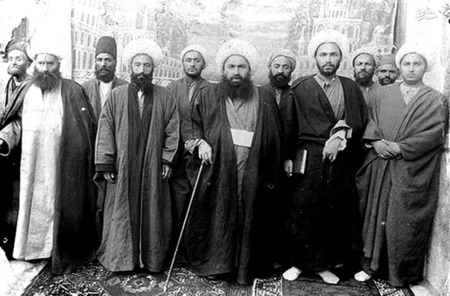
Opposition to the Majles began to emerge in Moḥarram 1325 (14 February-15 March 1907), when some of the Tehran preachers started criticizing constitutionalism and assembly. Amid rumors that he was under the influence of some of the conservative ulama, on 10th February the shah informed the Majles that he would not accept the word mashruṭa but would agree to mashruʿa, a proposal rejected by the assembly. It was probably then that Shaikh Fażl-Allāh began to form a connection with Moḥammad-ʿAli Shah. He was one of those who, in March, supported the swearing of allegiance to the shah, as stated in the code of the Majles, before the proposed new constitution was ratified, contrary to the objections of some members who believed the constitution should be ratified first. By May 1907 he had become highly concerned at the growing turbulence in the country, and that the community and government of Islam (mellat va dawlat-e Eslām) were being undermined. He was also concerned about the implications for the shariʿa of Article 8 of the Supplementary Fundamental Law (Motammem-e qānun-e asāsi), which stated that all the people of Iran were to be equal (motasāwi’l-ḥoquq) before the law, and about Article 20, which declared freedom of the press and banned censorship (momayyezi). In response to the proposed amendment, Shaikh Fażl-Allāh drafted a new article that stated that all proposed legislation passed by the “the Sacred National Consultative Assembly (Majles moqaddas-e shurā-ye melli)” should be submitted first to a council of high ranking mojtaheds and jurists (anjoman-i az ṭarāz-e avval-e mojtahedin va foqahāʾ) and to ensure that it was in conformity with the shariʿa, and that only thereafter could it become law.
The draft, however, did not state how the council would be chosen. A struggle ensued between Shaikh Fażl-Allāh and the more conservative ulama, and the secularist radicals led by the Tabriz deputy, Sayyed Ḥasan Taqizādeh, who argued that Article 27 already stated that any laws passed should be in conformity with the shariʿa .On 12 June 1907 a new draft of the article was introduced to the Majles, with the significant addition that members of a proposed council of no less than five theologians should be chosen by the Majles from a list of twenty submitted by the leading ulama (Moḏākerāt-e Majles, Session 104, 3 Jomādā I 1325/14 June 1907. This draft, apparently written by Shaikh Fażl-Allāh (Kasravi, p. 372), became Article 2 of the Supplementary Fundamental Law of October 7, 1907. On the one hand, in principle, it gave the Majles a measure of control over the proposed council; on the other, it established the power of the clergy to interfere with legislation to the detriment of the authority of the Majles. In essence, it epitomized the subsequent struggle between religion and secularism in Iranian politics.
Despite the Majles accepting a compromise version of his article, Shaikh Fażl-Allāh remained deeply unhappy with secularist implications of the emerging draft of the constitution. At this stage, he separated from and Ayatollah Behbahāni and Ṭabāṭabāʾi, and on 19 June 1907 he and his following of mainly ulama and theological students (ṭollāb) but also of toyuldārs and members of the poorer classes came out in open opposition to the Majles in an attempt to rally support against the constitutionalism cause. However, they generated such a dangerous response from the pro-Majles societies (anjoman) that they took asylum (bast) in the shrine of Shāh ʿAbd-al-ʿAẓim in the southern suburb of Tehran. They informed the shah that the Majles had nothing to do with the four fundamental principles of Islam (i.e., oneness, prophecy, imamate, and resurrection) and sent a telegram to the main cities announcing their intention to protect the laws of Islam. In Tehran, where there was much opposition to them, it was widely believed that they were subsidized by the shah, a view endorsed by the British. However, it is also claimed that Shaikh Fażl-Allāh had raised loans on his own account to finance the bast, and he was certainly substantially in debt, particularly to the Imperial Bank, when he died. Meanwhile, the controversy over constitutionalism and Islam spread to Najaf, where Aḵund Mollā Moḥammad-Kāẓem Ḵorāsāni, Shaikh ʿAbd-Allāh Māzandarāni, and Moḥammad-Ḥosayn b. Ḵalil supported the Majles, and Sayyed Kāẓem Yazdi observed a position of non-commitment seen as favoring Shaikh Fażl-Allāh.
From late July to early September 1907 the bastis propagated their cause in a series of printed leaflets, which may be said in sum to represent the view of Shaikh Fażl-Allāh. The strongest argument brought against the Majles was that it had no legitimate basis in sharʿ law, and that its establishment would therefore undermine the shariʿa. Shaikh Fażl-Allāh further claimed that the needs of the people of Iran in all aspects were covered by the shariʿa, thus implying that it was integral to the country. He rejected the constitutionalist argument that the shariʿa could be altered according to the exigencies of the age, since it was a perfect law granted by God. Further, without a rightful source for its power, that is, the divine law, the Majles did not belong to that which had to be obeyed, namely God, the Prophet, the Imams and their deputies, and it therefore could not claim to be the ultimate source of authority (olo’l-amr). The second significant charge against the constitutionalists was that they had perverted the original vision of the institution, which the ulama had requested, and created in its place a European parliament, to the legal practice of which they were now attempting by alteration to make the shariʿa conform. The bastiswere particularly indignant that the word “eslāmi” (Islamic) had been omitted from the original designation of the Majles that the ulama had sought, which Shaikh Fażl-Allāh defined as, “The great Islamic House of Consultation established through the efforts of the proofs of Islam and general agents of the Imam to serve and assist the Twelver Shiʿite government, and to protect the rights of the followers of the Jaʿfari faith.” This objective, he claimed, had been undermined by Babis, heretics, and infidels (meaning the constitutionalists), who had introduced such alien concepts as national consultation, freedom, equality and a fundamental law (meaning one not based on the shariʿa), thus perverting the principle of “enjoining what is proper or good, and forbidding what is reprehensible or evil” (amr be maʿruf va nahy az monkar) into a command to enjoin evil and prohibit good.
Shaikh Fażl-Allāh also addressed the alteration of his amendment to the constitution giving the Majles a role in the selection of the Council (hayʾat) of ulama, and demanding that its members should be appointed by the ulama alone. He complained about the erosion of the authority of the ulama and that of the shah by “Bābis and secularists,” by which he meant the advancement of the concept of authority based on the will of the people. The authority of the shah as “Sultan of Islam” was further being undermined by the current language being used in, for example, the term salṭanat-e estebdād. In particular, however, he attacked the constitutionalist concept of liberty, which term he defined as existing only in the sense of being confined by the principles of the shariʿa, and which, in the form of freedom of the press, he perceived it as anarchic and seditious. He strongly objected to the notion of equality before the law, and numbered among the iniquities of the Majles the fact that it gave the Zoroastrians the freedom to propagate their faith. As a riposte to the constitutionalism of the Majles, and all that it represented in his view, he proposed an argument for mashruṭa-ye mashruʿa, constitutionalism according to the shariʿa, meaning a version that drew its authority from the divine law, and was basically framed from it, but was still based on consultation and some responsibility of the monarch to an assembly, though he was not precise about it.
The arguments of the bastis were strenuously resisted in Tehran, not least in the debates in the Majles and the press, and, whilst not being widely popular, they had sufficient success to cause concern, notably among the more pious members of the guilds. Financial support from the shah and court continued, which meant they also attracted a following from the poorer classes including roughs. On 21 Rajab 1325/31 August 1907, the situation changed with the assassination of the grand vizier ʿAli-Aṣḡar Khan Amin-al-Solṭān. The resultant insecurity, combined with the fact that Shaikh Fażl-Allāh was having little success, led him to emerge from asylum on 16 September 1907.
With the passing of the Supplementary Fundamental Law in October 1907 tensions built up between the shah and Majles. On 14 December 1907 an anti-constitutionalist crowd, mainly of roughs, established itself in the Tupḵāneh Square, organized by the Moḥammad-ʿAli Shah. It was joined by camel-drivers, muleteers, cannon-keepers, servants of the guardhouse, and soldiers of the regiment of the arch-conservative Ḥosayn Pāshā Khan Amir Bahādor. These were later joined, though ostensibly under some duress, by the anti-constitutionalist ulama, including Shaikh Fażl-Allāh. The Majles took a strong stand against the shah, with the support of a large crowd, and on 23 December the shah was forced to yield and disperse his followers. Shaikh Fażl-Allāh sent a telegram to the ulama of all the provinces requesting assistance, but it was to no avail, since he was mainly perceived as having connections with absolutism. Both this campaign and the earlier one in the summer had little effect outside of Tehran. This was notably so in Tabriz, Shiraz and Bushehr, where there was virtually none. However, there were serious disturbances in Isfahan, and Qom.
At the end of December 1907, Shaikh Fażl-Allāh gave up his open opposition, having been designated a source of sedition whose participation in affairs was forbidden by Moḥammad-Ḥosayn b. Ḵalil, Moḥammad-Kāẓem Ḵorāsāni, and ʿAbd-Allāh Māzandarāni. He did not resume open engagement in politics until after the bombardment of the Majles in June 1908.
From August 1908, Shaikh Fażl-Allāh essentially supported the absolutist cause, not because he believed in it as such, but because he considered constitutionalism to be contrary to the shariʿa and inimical to Islam. He also, however, believed that royal rule should be bound by legal restraints, not least the shariʿa. In a treatise on the banning of constitutionalism and the Constitution, written in late 1908 to justify the destruction of the Majles and thus in support of Moḥammad-ʿAli Shah, he returned to his argument that the preservation of the religion and believers depended on the cooperation of the state and the ulama. As he expressed it in 1908, he used the argument to support the authority of the shah and to provide him with a legitimizing ideology against the Majles. He said that prophecy (nobovvat, Ar. nobowa) and worldly rule (salṭanat) were supplementary and complimentary to each other and the foundation of Islam depended upon them. Without these two Islamic precepts, that is deputyship in the affairs of prophecy (niābat dar omur-e nabaviya) and worldly rule, the religion would collapse. He added that worldly rule was the authority to execute the commands of Islam, on which justice depended. 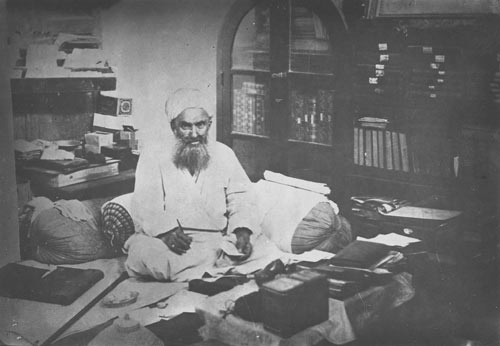
In the treatise Taḏkerat al-ḡāfel wa ershād al-jāhel, which represented his arguments, he said that in practice there was a division between the affairs of government and those of the religion, by which he made clear that he had no objection to the ʿorf law as such. However, the problem with the Majles was that it did not accept this division, and thus was attempting to enforce its legislation in matters related only to the shariʿa. In particular, he stated that velāyat (government) in absence of the Imam of the Age (Emām-e ʿaṣr) devolved on the ulama, and he attacked the concept of the authority of the majority vote, and its representation as a valid source of authority in Imami Shiʿite law. Above all, Shaikh Fażl-Allāh objected to the concept of equality, meaning non-Muslims would be equal with Muslims. He pointed out that, under constitutionalism, Muslims would lose their advantageous status under the shariʿa, and, on the other hand, adherents of other religions would gain a voice in the affairs of the religion. He used the five qualifications of Islam (aḥkām al-ḵamsa: vājeb, mandub, mobāḥ, makruh, ḥarām [obligatory, recommended, indifferent, reprehensible, forbidden], to argue that constitutionalism was reprehensible, as it made laws (which it was obligatory to obey) on matters that the Prophet had designated as permissible. In effect, he implied that constitutionalism undermined the religious and moral purpose of Islam.
Shaikh Fażl-Allāh’s arguments were strongly contested by the pro-constitutionalist ulama of Najaf, in particular Mirzā Moḥammad-Ḥosayn Nāʾini representing the views of Āḵund Mollā Moḥammad-Kāẓem. They argued that in Shiʿism the only rightful government was that of the Imam of the Age, but in his absence constitutionalism was the least unjust alternative, much preferable to absolutism. Furthermore, Ḵorāsāni believed that constitutionalism was the best means of protecting Shiʿi Islam, the religion of Iran, from untrammeled absolutism. Government by the representatives of the people was Ḵorāsāni’s preferred choice; but the laws should be written under the supervision of the theologians (mojtahed), whose duty was to ensure justice at the time of the absence of the Imam of the Age, a principle enshrined in Article 2 of the Supplementary Fundamental Law. This, of course, was Shaikh Fażl-Allāh’s argument, except that he understood, while Ḵorāsāni and Nāʾini did not, the secular implications of the theologians being chosen by the Majles, which would lead to the encroachment of the Majles on the authority of the Deputies of the Imam in the general affairs (omur-e ʿāmma). In other words it crossed the boundary between the ʿorf law and the shariʿa. Ḵorāsāni later also used against Shaikh Fażl-Allāh the argument that constitutionalism was the best and most just form of government, not only because it respected the shariʿa, but also was based on the mass of Muslims.
As the constitutionalist forces approached Tehran in July 1909 (Jomādā II 1327), there was still some support for the shah in Tehran, especially in the Sangalaj quarter, and Shaikh Fażl-Allāh wrote to the prime minister to obtain arms from the shah to resist them. After Moḥammad-ʿAli Shah abdicated in July 1909, he took refuge in the Russian Legation, but Shaikh Fażl-Allāh, declined the offer of taking refuge in an embassy, unlike other supporters of the shah.
Martyrdom
Finally, Sheikh Fazlullah was arrested on 31 July 1909 (13 Rajab 1327) and after 3 days of sham trial he was sentenced to death by a verdict from a deviated fake clergy. At the threshold of being hanged, 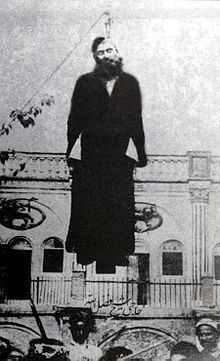 he received a message that he would be rescued if he confirmed such kind of constitution. He responded, “I dreamed Prophet Muhammad last night who invited me to his feast for tonight. I never sign and confirm such a thing.” The late Jalal Al-e-Ahmad writes in his On the Services and Treasons of Intellectuals, “The hanged corpse of that honorable man is for me akin to the flag of domination of occidentosis raised above the country after 200 years of struggle.” He was to be remembered as a martyr for the cause of Islam by the Islamic Republic.
he received a message that he would be rescued if he confirmed such kind of constitution. He responded, “I dreamed Prophet Muhammad last night who invited me to his feast for tonight. I never sign and confirm such a thing.” The late Jalal Al-e-Ahmad writes in his On the Services and Treasons of Intellectuals, “The hanged corpse of that honorable man is for me akin to the flag of domination of occidentosis raised above the country after 200 years of struggle.” He was to be remembered as a martyr for the cause of Islam by the Islamic Republic.
 Ijtihad Network Being Wise and Faithful Muslim in the Contemporary World
Ijtihad Network Being Wise and Faithful Muslim in the Contemporary World
